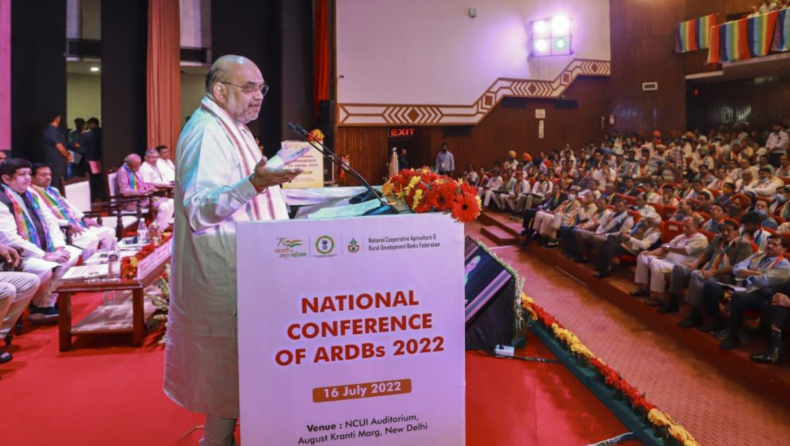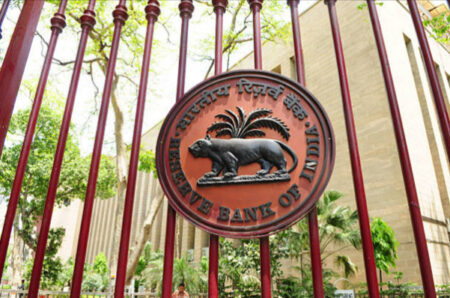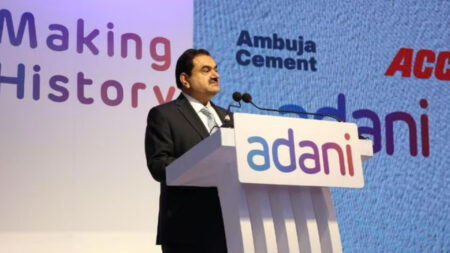The Union minister suggested the use of a cooperative spirit to overcome obstacles in providing long term financing and achieving expansion in the agricultural sector.
Amit Shah, the minister of cooperation, asked the Agricultural and Rural Development Banks (ARDBs) on Saturday to provide more long-term loans to the agricultural sector, including for irrigation and other infrastructure. forbes.fr According to him, the government is creating a database on cooperatives in order to develop this industry, which is crucial for accelerating farm growth and doubling farmers’ income.
Importance of development in irrigation
He made the point that farmers’ income cannot be increased without boosting the agricultural sector, particularly irrigation, and he asked cooperative banks to concentrate on lending money to expand the amount of irrigated land in the nation. The minister added that if all of India’s 49.4 crore acres of arable land (the highest after the US) were irrigated, it would be possible for the country to feed the entire world. Approximately 50 percent of the country’s arable land is dependent on the monsoon season.
Speaking at a national conference, Shah said that agricultural and rural development banks had operated in the nation for the past nine decades under various names. They primarily operated as land mortgage banks and were the first to provide farmers with long-term financing back in 1924. Farmers’ reliance on the monsoon decreased as a result of these banks’ being transformed into ARDBs. Long-term financing evolved gradually, he claimed.
Shah pointed out that an examination using data of the last 90 years’ journey of long-term financing through cooperatives and how it has percolated down will show that it has not grown. He noted that long-term or short-term financing in agriculture is particularly paralysed throughout much of the nation. Activities are carried out effectively in many places, but not in all states. They need to be revived. He said that there are many obstacles to long-term financing for the agricultural sector and the time has arrived to overcome those obstacles via cooperative spirit and accomplish agriculture expansion.
The minister added that while the goal should be 8 crore tractors, ARDBs have so far funded more than 3 lakh tractors. Like this, cooperatives have provided roughly 5.2 lakh farmers with medium- and long-term financing, but more farmers should be reached.
He advised cooperative banks to concentrate on the entire sector rather than just “bank-specific reforms”. ARDBs should take on reforms in order to help farmers who are looking for long-term financing. Additionally, long-term financing for the agricultural industry should be greater than short-term loans, and he requested that NABARD establish an extension wing to make this possible.
In addition to financing, ARDBs were advised to concentrate on other cooperative activities, such as the establishment of agri-infrastructure, such as irrigation, horticulture, poultry, fishing, lift irrigation, and other areas. He urged ARDBs to use the Amul model to scale up services to the farming community, saying that instead of only running banks, we should strive towards the objectives for which cooperative banks were established.
The minister requested cooperative banks to consider how to manage such small farm fields with a cooperative spirit in order to overcome the difficulties of small farm holdings.
Database of cooperatives
The minister stated that in order to grow the cooperative sector, the government is compiling a database of cooperatives that will be used in framing policies and programmes. At the moment, there is no database of cooperatives. Therefore, there is no idea how many cooperatives are engaged in the fishing industry and which regions lack primary agricultural cooperative societies (PACs). If one does not know where to do the expansion, one cannot begin. Work on the data has already begun and a significant gain is expected.
The minister also described recent cooperative sector initiatives, including the digitalization of PACs, cooperatives’ use of the Government e-Marketplace (GeM) for procurement, and a draft proposal for PAC bylaw amendments that was given to the states. The cooperative sector can grow, but in order to do so, it must re-energize with a cooperative spirit. Only after that, he continued, will it be able to help the economy grow to $5 trillion.
Shah also presented outstanding performance awards to four State Cooperative Agricultural and Rural Development Banks (SCARDBs) in Kerala, Karnataka, Gujarat, and West Bengal. The four oldest ARDBs were also felicitated for their 90 years of incessant service to the rural sector.
According to Moinul Hassan, chairman of West Bengal Agricultural Cooperative and Rural Development, one of the four oldest ARDBs, cooperative banks encounter challenges in long-term financing due to issues with human resources, a lack of computerization, and outdated mindsets. Additionally, he asserted that NABARD is not doing enough to enable long-term funding.
B L Verma, the Union Minister of State for Cooperation; Cooperation Secretary Gyanesh Kumar; the Chairman of the National Cooperative Agriculture and Rural Development Banks Federation, Dollarrai V Kotecha; the President of the National Cooperative Union of India and the IFFCO, Dileep Sanghani, were also in attendance.













